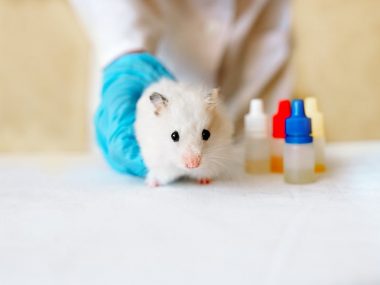Before you run that nice warm bath in the sink for your hamster, STOP! Water and hamsters don’t mix, and if they do, you may end up without your furry friend. Learn why hamsters are not the “swimming type” and what you should do instead to clean them.
Table of Contents
Can Hamsters Swim?
Hamsters are capable of swimming. However, they instinctively stay away from water. If a hamster is in a situation where it is forced into the water, it knows how to paddle its feet. Exhaustion can quickly take over causing hamsters to drown.
In the wild, hamsters live in native habitats where conditions are desert-like. It’s rare for a hamster to encounter a body of water. So, in the event they face going into the water, going around it, or avoiding it altogether, guess which choice they’ll make?
So, can dwarf hamsters swim since they are so tiny? You bet they can if placed in the same situation as any other hamster. Regardless of size or species, a hamster has the same instincts.
Why A Hamster Should Never Get Wet
PetMD published an article on bathing hamsters where Lauren Paul of North Star Rescue (a rodent rescue group in California) states hamsters should not be bathed in water unless it’s warranted by an emergency situation. She goes on to state that a wet hamster is more likely to bite.
Water is considered a biological enemy to a hamster. The coat of the hamster contains natural oils that play a vital role in the health of the coat. A hamster depends on the coat to provide insulation and protection against the elements. Without it, it will surely die.
The oils in your hamster’s coat are water-soluble and break down when coming into contact with water. Without the oils, your hamster’s coat becomes very unhealthy with a brittle-like appearance. The coat no longer functions as an insulator, and your hamster may begin to experience hypothermia (chills, cold, drop in body temperature.) This condition is life-threatening for rodents. Shock quickly sets in for a wet hamster, and the prognosis may not be favorable. Other illnesses such as pneumonia and wet tail may occur from getting wet.
Reasons A Hamster Should Never Get Wet
- Water breaks down the integrity of the hamster’s coat ability to insulate and protect.
- Water causes extreme stress for a hamster.
- A hamster suffers hypothermia, shock, and potentially death.
- Other illnesses can occur as a result of getting wet that may also be fatal.
Can Hamsters Drown In Water?
Should a hamster find itself in a large body of water or it has gone into shock, it can easily drown. Baby hamsters who have become mobile in a cage can drown if they happen to fall into a water bowl. For this reason, it’s best to use a nozzle waterer if you have baby hamsters.
Should I Let My Hamster Swim In The Sink?
One of the most common questions new hamster parents ask is, “Can you give a hamster a bath?” This question pops up when our hamster begins to become a bit smelly. If you’re wondering how to bathe a hamster that smells, the best piece of advice we can give you is to avoid a water bath.
A hamster should never be placed into any water, whether it be a bowl, sink, pool, etc. A warm soak to us is a death sentence to a hamster. A sand bath is the healthiest (and most preferred by hamsters) option. Check out our article on sand baths that explains what they are and why a hamster should have one.
Avoid The Water At All Costs
As tempted as we are to bathe a hamster or let it enjoy the pool, avoid the water. Hamsters are fastidious groomers. We may perceive them as unclean at times; by their standards, they are clean as a whistle.






